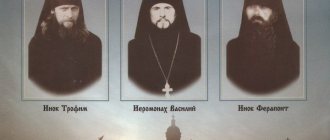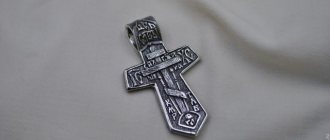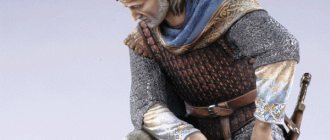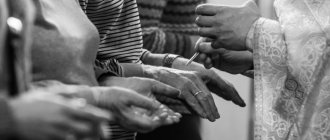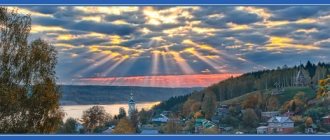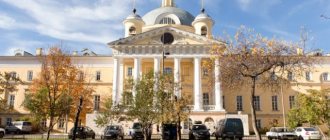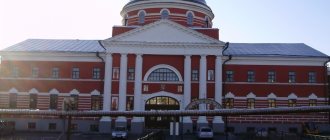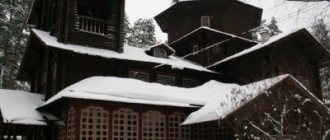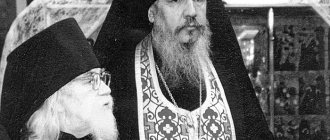Monk Ferapont
During the evening service, I walk around the temple with censing and suddenly I see a book behind the glass of the candle box. On its cover is an image of the Optina new martyrs: Hieromonk Vasily, monks Ferapont and Trofim. I show them reverently, but in my memory - the Optina guardhouse, the attentive, silent novice and the one “confessing” to him - a confused boy, a sick soul... When was this? It seems like a thousand years ago. But now - the breath has come, the breath has come to the family, forgotten and there is no time. Only eternity is alive, hidden until the end and unchangeable...
* * *
There was a turning point, a difficult moment in the life of my family. My brother was increasingly drawn into the quagmire, from which - I knew - not many manage to get out. And although I myself, as they say, “dabbled” in drugs, I swore off everything: I would quit myself and I could help my brother. However, my arrogance invariably failed, and time after time I plunged deeper into the swamp of a sinful life.
One day, almost by accident, I saw on TV an excerpt from a program about Optina Pustyn. Later I found out that this was an interview with the now deceased Abbot Theodore. He didn’t seem to say anything special, but I was struck by the genuine, pure joy with which his face shone. I don't know why, but it made a strong impression on me. I sat at the screen, holding my breath, and felt that the very REAL thing that I had always been looking for, since childhood, had happened in my life. Impressed by what I saw, I decided to visit Optina Pustyn at any cost.
But time passed, my emotions subsided, and I didn’t go anywhere, blithely believing that my life would somehow work out on its own.
However, by the summer of 1992, the clouds thickened over our family and the first rumbles of an approaching thunderstorm sounded. The brother’s agronomic talent was used in the production of narcotic raw materials of such quality that bandits, of whom there were a great many at that time, immediately became interested in him. Threats, unceremonious invasions, and “assaults” began, plunging us all into a state of oppressive hopelessness that was growing every day. It seemed as if a terrible catastrophe was about to break out.
On one of these days, having consumed a “forbidden product,” I was about to plunge into the usual delusional world, when suddenly before my inner gaze appeared... an icon of the Mother of God with the Eternal Child in her arms. It was not a hallucination or a figment of a disordered imagination, but an instant and complete sobering, completely unexpected for me and even more shocking.
The icon was wooden, without a frame, and I managed to examine and remember its main features. And the next moment my heart seemed to collapse before the surging wave of grace, and I unexpectedly burst into tears in painful and bitter powerlessness. It was as if I appeared before the Light in all my obscenity, and I wanted to stay with the Light, but there was a world behind me, and I knew that I could not cope with this world.
This incident, again, made a strong impression on me and had the following effect: Lately I have been painfully choosing my path. I was attracted and fascinated by the East with its charm, mystery, dreams, but Russia also stood before my eyes - so slack and wretched, but DEAR, and it was absolutely impossible to get rid of it. In desperation, I tried to connect everything into one, but as a result I almost went crazy and only realized with merciless obviousness that I could not escape the choice.
I perceived the appearance of the icon of the Mother of God - the patroness of Rus' - as a clear indication that my path lies in the domestic - ORTHODOX tradition. Thus a turning point took place in my soul, which affected my entire subsequent life.
A little more time passed, September arrived, and then one evening, after a painful scene, which I will not talk about now, my determination matured.
I packed everything I needed into a small backpack, bought a ticket for the morning and, as I was - in summer clothes - without thinking about the timing, I went to Optina Pustyn.
Russia greeted me harshly in autumn. A cold, piercing wind was blowing; It started to rain from time to time, but not for long. Lead clouds rushed low, changing their outlines, spreading like old canvas, but even then it was not the heavenly blue that was visible, but a dull gray cold.
The loose bus, rattling with all its trains, stopped in the middle of the highway, hissed with faulty pneumatics and let me out onto the side of the road. Not a sign, not a hint that nearby, somewhere, one of the famous monasteries of Russia. The old ladies who got off the bus with me helped out. Bent, withered, tapping their little sticks, they walked briskly in a crowd... and I already knew where.
There are pine trees all around, a real ship's forest. Slender, straight trunks are directed upward and there the green surf makes a high noise, incessantly in the wind. The earth is not even earth, but solid sand, and because there is no dirt, it seems dry even in wet weather. Dry and clean.
Well, here is the monastery! The gates in the impenetrable wall, like a fortress, are wide open. Having said a prayer, I made the sign of the cross, bowed and... - with God! – stepped into the monastery courtyard.
And the first thing I saw was a monk walking in my direction from the temple, dressed in all black. In his hand he had a long woolen rosary, which he fingered slowly, apparently praying. His head was somehow tilted to the side, and his whole figure exuded detachment and deep peace.
I went forward. I wanted to ask the monk about how I could get settled, but he didn’t notice anything around me and would certainly have passed by if I hadn’t turned to him with a rather ridiculous question - the first one that came to my mind:
- Excuse me, are you a monk? – I asked.
He stopped, looked at me carefully and calmly, and answered with a barely noticeable good-natured smile:
- No, I'm a novice.
He was wearing a black hoodie pulled low over his eyes. His wide face, generously covered with freckles, was framed by a thick red beard. The eyes - I remember this clearly - were light; maybe gray or even blue and looked with soulful, deep seriousness. In general, from the first meeting I was struck by one peculiarity in him: he could look his interlocutor straight in the eyes during a conversation, and this did not embarrass him at all, because in his gaze one could feel sincere compassion and love. He spoke slowly and restrainedly, but at the same time with an inviting simplicity. It is unlikely that he was more than five years older than me,[1] but his very appearance reeked of some kind of harsh antiquity, as if he had already been thoroughly imbued with the centuries-old monastic spirit.
I began the usual questions for a traveler, but soon our conversation acquired such an intimate character that I, carried away, unexpectedly expressed to my random interlocutor all the most painful and burning things that were in my heart.
He listened attentively, without interrupting, then looked at his watch and explained that I should wait for the commandant of the pilgrimage hostel, but since he would appear only in the evening, then for now... And the novice invited me to warm up in the guard room at the gate, where he apparently carried out obedience . Needless to say, by that time I had a toothache from the cold.
Here, in the back room, littered with some suitcases, parcels and bales, we continued our conversation. By the way, I later learned that, according to the instructions, Volodya (that was the name of the novice) was under no circumstances supposed to let me into the guardhouse where the pilgrims’ valuables and documents were kept. But here’s the thing: instructions, even the most verified and precise ones, do not always coincide with the dictates of a living, God-loving heart. And here, looking ahead, I would like to say that in the behavior of Ferapont (this is the name Vladimir received when he was tonsured), what captivated me, first of all, was the complete lack of deliberateness. He spoke and acted truly from the abundance of his heart, which, at the same time, he knew how to restrain. However, the effect of this restraint was the opposite: the soul submitted to the wealth of the hidden, deep life, invisible and therefore even more attractive and obvious.
The surprising thing is that, having known Vladimir for only half an hour, we agreed on a heartfelt conversation about the most intimate monastic work - about the “smart doing” of the Jesus Prayer. And here’s what’s strange: I’m looking for that burning heart, that special fiery love for prayer that filled me then, and I still can’t find it. Maybe it was that “calling grace” that is given to beginners, so that they would later know what to look for and not despair in difficult moments of life?.. After our conversation - very sincere and simple - it was strange for me to learn that Ferapont He is known in the monastery as a silent, unsociable and reserved person. But if he seemed like that, then in essence he was not silent, but silent; ran away from human communication, but only because he did not want to lose communication with God; closed himself off, but not “in himself,” but in the cage of the heart, in order to find that Kingdom of God, which we must all seek first of all in the world.
What did Volodya tell about himself at that first meeting? As far as I understand, his path to the monastery was not easy. This was evidenced even by the fact that he had tattoos on his arm, but it was all the more surprising to hear his speech, to observe behavior in which the features of past rebellion did not appear in the least. Everything was simple, open in him, despite his restraint, and filled with some kind of special, spiritual courage. It was these qualities of his: courage and simplicity that I remember, first of all, as well as his piercing aspiration towards God... I remember, from Vladimir’s words, that he was fond of martial arts “in the world” and even achieved significant results in this matter. I remembered this more than once after his martyrdom. Maybe he could have at least done something to protect himself, well, at least tried?.. He didn’t do it... And it was in this that, I think, that very courage that I spoke about was manifested to the highest degree.
I was also struck by another circumstance that testifies to Vladimir’s determination. When one of the elders of the Trinity-Sergius Lavra blessed him to go to Optina Pustyn, Vladimir not only fulfilled obedience, but during the next two years of his stay in the monastery he never left it, even when necessary, say, to neighboring Kozelsk, as many did . Later we even argued with him about this. I said with longing about Crimea that in Optina it is good to light the candle of faith in order to then carry its light to our native lands. Volodya strongly disagreed with me and answered with surprising firmness: “Optina is my home. I’m not leaving here anywhere!” But he was then just a novice and one can only guess how hard it was for him to resist the temptations of the world that he so suddenly left.
For example, a girl with whom he had deep and serious feelings, shocked by his action, came to the monastery several times with a prayer to return to the world. And it’s scary to think what this strong, healthy man must have experienced, what his faith must have been like, in order to resist his adamant intention to serve the One God with his whole life!..
When I try to understand why we so easily found a common language with him, it seems to me that Vladimir guessed in me that tense, sick rebellion of the soul that was once characteristic of him. He saw my state of mind and tried to support me as best he could, knowing exactly what I needed at this decisive, difficult moment in my life... From the gatehouse I went to the central one, the Vvedensky Church, and here unexpected joy awaited me. To the right of the altar I found a large wooden icon without frame, in which I undoubtedly recognized the One who had appeared to me at home.
Heading to the pilgrimage refectory after the evening service, from a distance I saw Volodya, who was standing near the guardhouse, and, as it turned out, was waiting for me. In his hands he had a warm jacket and the book “Frank Stories of a Wanderer to His Spiritual Father.” No matter how I refused, he insisted that I accept these things as a gift. However, needless to say, the jacket could not have come at a better time, and the book about “smart doing” was a direct continuation of our recent conversation.
My Optina life has begun.
Until the Intercession, when there was already snow, Vladimir’s jacket remained my only warm thing. It was already frosty, up to ten degrees, and I won’t say that I wasn’t freezing at all, but somehow the cold didn’t penetrate inside: I felt it on my skin, but nothing more. Finally, Fr. Nikon, who was then a prosphora student, got angry at me: “It’s winter outside, why are you walking around in just a jacket! Stop acting like a fool." I explained that my “foolishness” was forced, and then the priest found an old quilted jacket for me, in which I wore it until spring.
I rarely met with Vladimir now, and we no longer talked with him as thoroughly as the first time. I began to work at “obediences”, in my free time, hand-turning balls for rosaries from juniper and cypress branches brought from the Crimea. This painstaking and difficult task served several purposes. First of all, I really wanted to make myself a rosary and take the blessing to pray it. Secondly, while working, I tried to accustom myself to the Jesus Prayer and, finally, I became accustomed to patience, which, as I understood, is very, very useful for every person.
I definitely wanted to have time to consecrate my first rosary on the Feast of the Exaltation of the Cross. And now, the festive service is already underway, and I’m in a hurry to finish my work in my dorm. I adjust the cross, the “calvary” and run from the monastery to the monastery in order to have time to pass my rosary through the novice to the altar for consecration.
At the entrance, I see Vladimir in the window.
“Look,” I say, “I made a rosary, I’m going to bless it!”
- Well, show me. – Vladimir examines it carefully, slowly twirls the rosary in his hands, and I think to myself: Well, come on... quickly.
Finally, he returns the rosary to me and says:
- Yes, good job... Only your cross is hung upside down. This will not work.
- How so?!
“And this is how it is,” and he explains to me how the cross should be attached correctly: “like the hilt of a sword.” After all, a rosary is a spiritual sword... In a word, although I was saddened, but grateful to Vladimir for his advice, I went to redo my work with the thought that on a holiday, of course, it is better to stand in the service than to fuss about any “pious” about.
On the Intercession, three novices were tonsured as monks in the monastery. From the cellarer of the pilgrimage refectory, Fr. Theodosius, I learned that among them was Vladimir, who, with the giving of a new name, began to be called Ferapont.
I met him shortly after this event in the monastery courtyard. Everything was clear without words and instead of the usual congratulations in such cases, we simply hugged tightly, like brothers. It was a moment of incomparable joy, the triumph of some special, highest Truth that did not need proof or explanation, and I will remember this moment all my life!
For some reason, in all the books dedicated to the Optina new martyrs, the date of monk Ferapont’s tonsure is moved to 1991. But I can testify that this happened exactly in 1992 and not earlier.
After Vladimir became Fr. Ferapont, he became even more silent, collected and strict. Now he rarely looked into the eyes, more and more at his feet - at the ground. I understood that he was constantly praying and yet, when he did not answer my greeting once or twice - most likely not wanting to “dissipate” and counting on understanding - this, I confess, hurt my pride. It seems to me that he suffered during this period from the fact that he was forced to obey the inevitable spiritual rules of the community. He was already in torment of his soul. He wanted spiritual things, and it was obvious... It’s only a pity that then, realizing with my mind, I was not ready to accept it with my heart.
Meanwhile, I happened to dig up several ancient crosses from the Pafnutievsky well. The history of this well is as follows. It was abandoned under Soviet rule and was put in order in the summer of 1992. Moreover, while it was being cleaned with an excavator, it turned out that countless crosses, icons and coins had accumulated in the silt, thrown into the well by pilgrims throughout the history of the monastery. The sludge was transported by KAMAZ trucks to the field and dumped in one place, and then everyone sifted through the sludge and took home handfuls of everything they could find.
I heard this whole story already in the winter, when the excitement had long subsided. There was an “old-timer” who showed me the place where the silt was poured out and, after praying, we dug up two icons, five or six ancient crosses and several coins in a few hours.
I knew that Ferapont kept a whole collection of “Paphnutian” crosses, and therefore, when the ear of one cross broke off, I decided to turn to the monk for help. He had a sort of tiny workshop set up in the northwest corner tower, and I asked him to solder a lug. He agreed.
A week passed, then another... and Ferapont still had the cross. I made a vow to myself not to remind him of this, and yet an unpleasant feeling was stirring in my soul. I did not give in to him, but still, his presence to a certain extent poisoned my existence.
Finally, one day, leaving the temple, I met Ferapont, who silently handed me a cross wrapped in paper. I felt somehow sad and ashamed of my vain, petty experiences, and most importantly because they did not allow me to communicate with Ferapont in the same cordial and simple way. At the same time, I understood that essentially nothing had changed, that the temptations that came along were temporary and you just needed to be able to endure them, placing all your trust in God...
After Christmas, a general eviction of pilgrims suddenly began. This was explained by the planned renovation of the skete church of Leo of Katansky, in which the pilgrim hostel was located. The time has come for me to go home.
Simple belongings were quickly collected, a letter of recommendation was received from the office, money for the trip... The evening of January 12th was damp and quiet. The coming thaw concealed the whiteness of the snow, and the darkness around seemed endless and long-lasting. The truck that was supposed to take us to the station in Kozelsk rumbled, warming up the engine at idle speed. There was a minute - and I almost ran to say goodbye to Ferapont, but then I suddenly stopped; I thought: who am I - friend, brother? Not even a monk... And I stayed. I didn’t run... And soon our truck was swaying, bouncing on potholes, and I looked with aching, bright melancholy at the lights of Optina Pustyn receding into the darkness, which had become so familiar.
There will still be time... - I thought - See you for sure. See you. Just when?..
[1] I later learned that I was wrong by exactly ten years. This only confirms the old truth: people of spiritual life often look younger than their “earthly” age.
Relics and veneration
| St. Ferapont Beloezersky. Mon. Juliania (Sokolova), Sergiev Posad, 1970s |
The body of the Monk Ferapont was buried in the Luzhetsky monastery near the northern wall of the Cathedral of the Nativity of the Blessed Virgin Mary.
Later, at the burial site, a temple was built in honor of St. John Climacus, renamed in 1720 in the name of St. Ferapont. His veneration began soon after his death. In 1502, the newly rebuilt Nativity of the Virgin Cathedral of the Ferapontov Monastery was painted by the famous icon painter Dionysius with his sons Vladimir and Theodosius. On the southern wall of the cathedral above the burial of the Monk Martinian, even then there was a fresco depicted with Ferapont and Martinian falling to the throne of the Mother of God - intercessors and prayer books for the monastery [4].
In 1514, the incorruptible relics of Saint Ferapont, glorified by numerous miracles, were found. The canonization of the Monk Ferapont took place after the Moscow Council of 1547, at one of the councils between 1549 and 1551, when the abbot of the Ferapont Monastery brought Metropolitan Macarius the life and testimony of the holiness of the saint of God.
The life of the saint exists in the form of several handwritten copies and brief popular editions. The list kept in the St. Petersburg Theological Academy is considered to be the most complete. This manuscript, according to the historian V.O. Klyuchevsky, was compiled by the monk of the Ferapontov Monastery Matthew in the middle of the 16th century during the Makaryev Councils for the canonization of Russian saints. Based on the life of St. Cyril, it is possible to clarify some information about him that is not included in the life of Ferapont.
The relics of the saint subsequently rested hidden in the cathedral church of the Luzhetsky Monastery. In 1812, Napoleonic troops destroyed it, burned it and desecrated it. Then the silver shrine over Ferapont’s burial disappeared, and his life also disappeared, but the relics themselves were not touched, since they were kept under wraps. At the end of the 19th century, the life of the saint was again compiled from handwritten legends in the archives of the Luzhetsky Monastery, collected by its abbot, Archimandrite Dionysius.
The name of Saint Ferapont was fixed not only in the names of the monasteries he founded, but also in the former sub-monastery settlement, which became the village of Ferapontov, and in the part of Borodaevskoye Lake, which is adjacent to the monastery and is called Ferapontovsky, or Monastic Lake. One of the gate churches of the Ferapontov Monastery was consecrated in honor of the saint. Among the icons depicting Saint Ferapont, the oldest is the surviving temple image from the gate church.
